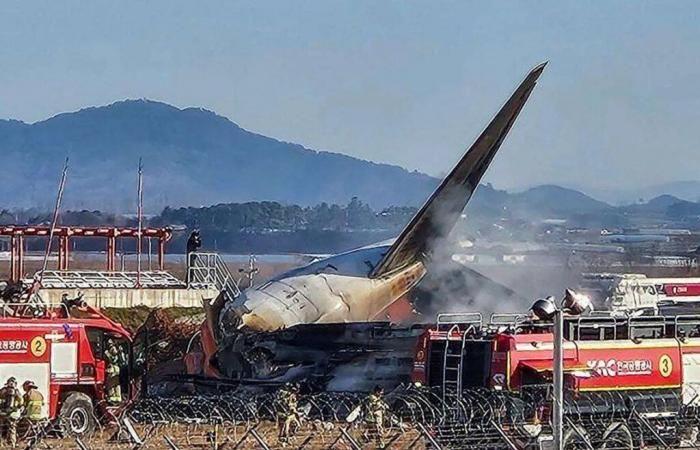On December 29, 2024, a major air tragedy struck South Korea when Jeju Air Flight 2216, a Boeing 737-800 carrying 181 passengers, crashed at Muan International Airport. This accident constitutes one of the worst in the recent history of aviation in South Korea.
The flight, which took off from Bangkok, Thailand, encountered technical difficulties as it approached its destination. According to initial information, a major problem with the landing gear forced the plane to make an emergency landing. During the maneuver, the plane made a belly landing, before skidding off the runway and hitting a barrier. The impact caused a devastating fire.
Human toll
The disaster cost the lives of 179 people. Of the 181 passengers and staff, only two survivors were found. South Korean authorities have deployed rescue teams and firefighters to bring the fire under control and search for possible survivors, but hopes are dwindling as the hours pass.
Potential causes of the accident
The preliminary investigation puts forward several hypotheses to explain this tragedy. A possible collision with birds or unfavorable weather conditions could have caused the landing gear to break. South Korean authorities are working with international experts and manufacturer Boeing to analyze the plane's black boxes.
Official reactions
South Korea's acting president, Choi Sang-mok, immediately called an emergency meeting to oversee the rescue operations and launch a thorough investigation into the accident. In a public statement, he expressed his condolences to the families of the victims and promised to shed light on the causes of this tragedy.
Consequences for Jeju Air
This is the first fatal accident for Jeju Air since its establishment in 2005. The airline, although renowned for its reliability, will face pressing questions regarding its fleet maintenance and safety protocols. This incident risks having a lasting impact on his reputation.
A national tragedy
This crash marks a dark day for South Korean aviation and for the entire country. As investigations continue, the priority remains supporting the victims' families and improving safety standards to prevent such disasters from happening again.
The investigation into the cause of the accident
The investigation into the causes of the accident promises to be long and thorough. In the meantime, provisional measures, such as strengthening technical controls on similar devices, are already being considered. The international community is also closely following events, offering technical and logistical assistance to South Korean authorities.






